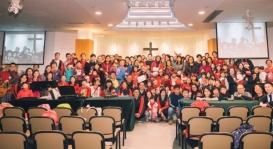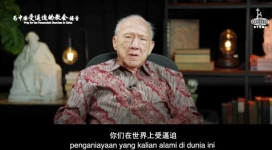SAN FRANCISCO – At least 64,000 people from all 50 states and more than 20 other countries have given money to support or oppose a ban on same-sex marriage in California, reflecting broad interest in a race that some consider second in national importance only to the presidential election.
Ten days before the vote on Proposition 8, campaign finance records show that total contributions for and against the measure have surpassed $60 million, according to an analysis by The Associated Press.
That would be a record nationally for a ballot initiative based on a social rather than economic issue, campaign finance experts say. It also eclipses the combined total of $33 million spent in the 24 states where similar measures have been put to voters since 2004.
If approved by California voters, Proposition 8 would overturn a state Supreme Court ruling that legalized same-sex marriages by changing the state constitution to limit marriage to a man and a woman.
Campaign committees formed to back or battle the amendment were close in fundraising as of Oct. 25, the AP's analysis found. Supporters had raised at least $28.2 million; opponents had taken in $32.3 million, closing a fundraising gap that had them $8 million behind a month ago.
The figures for each side are actually higher because small cash donations made since Sept. 30 had not yet been reported.
The measure is likely to attract more money than any race other than the billion-dollar presidential election, judging by campaign-finance data from other high-profile contests. The closest appears to be the U.S. Senate race in Minnesota, at $35 million.
"I'm surprised how much they are spending because I would have thought 90 percent of the people would have made up their minds on this issue," said Robert Stern, president of the nonpartisan Center for Governmental Studies. "But if this is a close race, that undecided 10 percent will decide the election. Every dollar, in a sense, counts."
The money pouring into the 13 committees promoting or challenging the measure has come from prominent religious conservatives and gay rights activists, Hollywood actors and moguls, teachers and CEOs.
Individuals who identified themselves as retirees and homemakers accounted for the most donations, giving more than $11 million. Self-identified lawyers gave $2.3 million.
On the yes side, the Knights of Columbus, based in New Haven, Conn., is the measure's largest single contributor so far, having given $1.4 million. Other top contributors to the Yes on 8 campaign were Irvine banking heir Howard Ahmanson Jr.'s Fieldstead and Co. foundation ($1.1 million); John Templeton Jr., son of the late Bryn Mawr, Pa., investor John Templeton ($900,000); the Tupelo, Miss.-based American Family Association ($500,000), and Elsa Prince, ($450,000), mother of Blackwater founder Erik Prince.
Knights of Columbus spokesman Patrick Korten said the Catholic fraternal organization has backed amendments limiting marriage to a man and a woman in every state where they have appeared. But none of the group's other contributions has come close to what the Knights are putting into the Proposition 8 race.
"California is the thousand-pound gorilla when it comes to laws of this sort," Korten said. "California is the big one, so everybody is involved in this who cares about the issue. You can't not be."
On the no side, wealthy individuals making million-dollar gifts account for all but one of the gay marriage ban's top six opponents. The California Teachers Association, the state's largest teachers union, is first, having pledged $1.3 million to fight the initiative.
Giving $1 million or more were retired New York hedge fund manager Robert W. Wilson; GeoCities founder David Bohnett; Jon Stryker, an heir to a Michigan media supplies company; WordPerfect software founder and Utah resident Bruce Bastian; and philanthropist David Maltz of Cleveland.
"I think this is a civil liberties issue, and California tends to be a bellwether state in this country and what happens there often spreads around," said Wilson, a longtime patron of the New York Public Library and the Whitney Museum of American Art. "I don't see any argument in favor of barring queer marriage."
The contest also has drawn contributions from notable names in government, business and entertainment, most opposing the measure. Among them: Hollywood producer Stephen Bing ($500,000); actor Brad Pitt ($100,000); producer George Lucas and Lucas Films ($100,000 combined); director Steven Spielberg and his wife, actress Kate Capshaw ($100,000); talk show host Ellen DeGeneres ($100,000); House Speaker Nancy Pelosi's campaign fund ($10,000); audio systems inventor Ray Dolby and his wife, Dagmar ($135,000); and personal finance guru Suze Orman ($10,000).
Nearly three-quarters of the total contributions have been from individuals or institutions based in California, with the rest from out of state or from 90 international donors, representing areas from England to Italy and Thailand to Taiwan. Nearly all international contributors opposed the measure.
The measure's opponents received a greater share of their money from outside the state or country — 33 percent compared with the 19 percent of out-of-state contributions reported by the initiative's backers.
Apart from California, the states whose residents and institutions have invested the most in the contest are New York ($2.5 million), Michigan ($1.6 million), Utah (1.5 million) and Connecticut ($1.4 million). Connecticut is about to become the third U.S. state to sanction same-sex marriage.
Campaign spending on Proposition 8 dwarfs the total of $11.3 million channeled into gay marriage measures this year in Florida and Arizona.
"This is the ball game. There is no other battle than this one, with all due respect to my colleagues in Arizona and Florida," said Frank Schubert, the professional campaign manager for Yes on 8. "If you are concerned about marriage and how it gets to be defined, this is where it will be decided."
Copyright 2008 Associated Press. All rights reserved. This material may not be published, broadcast, rewritten, or redistributed.







